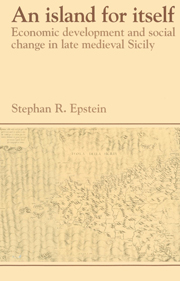Book contents
- Frontmatter
- Contents
- List of maps
- List of tables
- Acknowledgments
- Abbreviations
- Currency and measurements
- Chronology
- 1 Introduction. The historiography and the sources
- 2 Regional geographic and demographic differentiation
- 3 Market structures and regional specialization
- 4 Sicily and its regions. Economic growth and specialization
- 5 Sicily and its regions. Eastern val Demone and the southern mainland
- 6 Foreign trade and the domestic economy
- 7 Income distribution, social conflict and the Sicilian state
- 8 A further question: the origins of Sicilian underdevelopment
- Bibliography
- Index
- Past and Present Publications
4 - Sicily and its regions. Economic growth and specialization
Published online by Cambridge University Press: 06 January 2010
- Frontmatter
- Contents
- List of maps
- List of tables
- Acknowledgments
- Abbreviations
- Currency and measurements
- Chronology
- 1 Introduction. The historiography and the sources
- 2 Regional geographic and demographic differentiation
- 3 Market structures and regional specialization
- 4 Sicily and its regions. Economic growth and specialization
- 5 Sicily and its regions. Eastern val Demone and the southern mainland
- 6 Foreign trade and the domestic economy
- 7 Income distribution, social conflict and the Sicilian state
- 8 A further question: the origins of Sicilian underdevelopment
- Bibliography
- Index
- Past and Present Publications
Summary
In the previous chapter, I argued that the most important result of the late medieval economic crisis was to increase regional integration and specialization, and I suggested that the relative intensity and success of specialization depended critically on the institutions which shaped the access of individuals to markets. A further point of my argument was that the demographic slump caused by the plague provided a strong initial shock, setting processes of specialization in motion that would otherwise not have occurred.
According to Bresc, Sicily was unaffected by these changes. Its small population escaped the Malthusian trap and avoided the problem of diminishing marginal returns to land; agricultural productivity did not decline before 1300 or increase as a result of population losses thereafter. In Bresc's view, the effect of demographic losses (which were in any case quite low) was purely negative, causing a decline of more labour-intensive crops such as cloth fibres and vineyards.
The evidence presented in this chapter shows instead that events in Sicily differed in degree but not in kind from more general western European trends. Chapter 2 showed, by revising demographic estimates, that Sicily lost two thirds (rather than one quarter) of its population between the late thirteenth and early fifteenth centuries. Chapter 3 demonstrated in turn that major changes in the institutional structures of the home market occurred which increased opportunities for integration and specialization. We can now address the question of how, and to what degree, such opportunities were pursued.
- Type
- Chapter
- Information
- An Island for ItselfEconomic Development and Social Change in Late Medieval Sicily, pp. 162 - 239Publisher: Cambridge University PressPrint publication year: 1992



